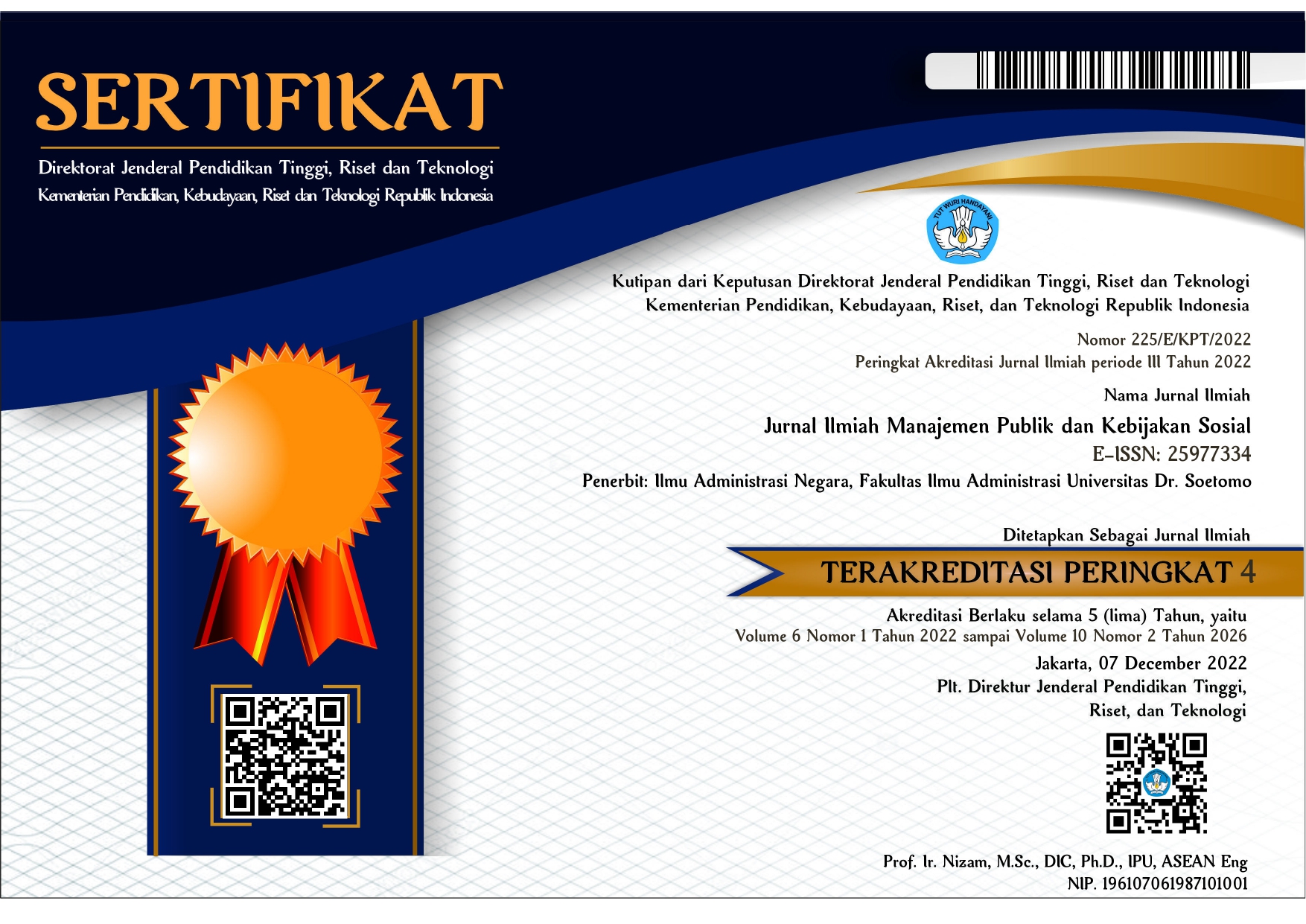Pengaruh Kesadaran Wajib Pajak dan Pengetahuan Perpajakan Terhadap Kepatuhan Wajib Pajak Orang Pribadi pada KPP Pratama Probolinggo
 Abstract views: 2591
,
Abstract views: 2591
,
 PDF (Bahasa Indonesia) downloads: 2324
PDF (Bahasa Indonesia) downloads: 2324
Abstract
This research aims to analyze the influence of taxpayer awareness and tax knowledge on individual taxpayer compliance at the Probolinggo Tax Office. Increasing taxpayer compliance is needed to increase tax revenues. The problem is that the individual taxpayer compliance at the Probolinggo Tax Office during 2019 to 2021 has decreased. This compliance includes compliance with the submission of annual tax reports and tax payments. The grand theories used are attribution theory and compliance theory. This research uses an associative quantitative approach. The population of this research is made up of taxpayers at the Probolinggo Tax Office, with a total of 124.385. Sampling in this research used accidental sampling technique and obtained a sample of 277 respondents. The data collection technique used was distributing questionnaires. This research only examines two independent variable which are taxpayer awareness and tax knowledge, while the dependent variable is individual taxpayer compliance. Data analysis in this research used multiple linear regression analysis. The software used is SPSS version 26. Based on the results of the analysis for the variables of taxpayer awareness (X1), tax knowledge (X2), and individual taxpayer compliance (Y), the regression model is obtained as follows: Y = 5.546 + 0.212X1 + 0.564X2. The results of the coefficient of determination show that the two independent variables can explain the dependent variable by 61.4%. The results of the t test show that taxpayer awareness has an influence on individual taxpayer compliance and tax knowledge has an influence on individual taxpayer compliance.
References
Andreoni, James, Erard, B., & Feinstein, J. (1998). Tax Compliance. Journal of Economic Literature, 36(2), 818–860.
Devano, S., & Rahayu, S. K. (2006). Perpajakan: Konsep, Teori dan Isu. Jakarta: Kencana Prenada Media Grup.
Fitria, D. (2017). Pengaruh Kesadaran Wajib Pajak, Pengetahuan dan Pemahaman Perpajakan Terhadap Kepatuhan Wajib Pajak. Journal of Applied Business and Economics, 4(1), 30–44.
Gusrefika, R. (2018). Pengaruh Kesadaran Wajib Pajak, Sanksi Pajak, Motivasi Membayar Pajak dan Tingkat Pendidikan Terhadap Kepatuhan Wajib Pajak (Studi Kasus Pada Wajib Pajak Orang Pribadi UMKM di KPP Pratama Tampan Pekanbaru). Jurnal Online Mahasiswa Fakultas Ekonomi, 1(1), 1–15.
Hartini, O. S., & Sopian, D. (2018). Pengaruh Pengetahuan Perpajakan dan Kesadaran Wajib Pajak Terhadap Kepatuhan Wajib Pajak Orang Pribadi (Studi Kasus Pada Kantor Pelayanan Pajak Pratama Karees). Jurnal Sains Manajemen dan Akuntansi, 10(2), 43–56.
Irianto, E. S. (2005). Politik Perpajakan: Membangun Demokrasi Negara. Yogyakarta: UII Press.
Mardiasmo. (2019). Perpajakan. Yogyakarta: CV. Andi.
Nasiroh, D., & Afiqoh, N. W. (2022). Pengaruh Pengetahuan Perpajakan, Kesadaran Perpajakan, dan Sanksi Perpajakan Terhadap Kepatuhan Wajib Pajak Orang Pribadi. RISTANSI: Riset Akuntansi, 3(2), 152–164.
Nasucha, C. (2004). Reformasi Administrasi Publik: Teori dan Praktik. Jakarta: PT. Gramedia Widiasarana.
Nasution. (2012). Perpajakan. Jakarta: Bumi Aksara.
Putri, K. J., & Setiawan, P. E. (2017). Pengaruh Kesadaran, Pengetahuan dan Pemahaman Perpajakan, Kualitas Pelayanan dan Sanksi Perpajakan Terhadap Kepatuhan Wajib Pajak. E-Jurnal Akuntansi Universitas Udayana, 18(2), 1112–1140.
Rahayu, N. (2017). Pengaruh Pengetahuan Perpajakan, Ketegasan Sanksi Pajak, dan Tax Amnesty terhadap Kepatuhan Wajib Pajak. Akuntansi Dewantara, 1(1), 15–30.
Rahayu, S. K. (2010). Perpajakan Indonesia: Konsep & Aspek Formal. Yogyakarta: Graha Ilmu.
Rahman, A. (2010). Panduan Pelaksanaan Administrasi Perpajakan Untuk Karyawan, Pelaku Bisnis dan Perusahaan. Bandung: Nuansa Cendekia.
Rosyida, I. A. (2018). Pengaruh Pengetahuan Perpajakan, Kesadaran, dan Pengetahuan Tax Amnesty terhadap Kepatuhan Wajib Pajak. Journal of Management and Accounting, 1(1), 29–43.
Suandy, E. (2011). Hukum Pajak (5 ed.). Jakarta: Salemba Empat.
Susanti, M., Dewi, S. P., & Sufiyati. (2017). Kepatuhan Pelaporan Wajib Pajak (Studi Kasus di Jakarta Barat dan Tangerang). Jurnal Bisnis dan Akuntansi, 19(2), 141–156.
Syahputra, H. E. (2017). Pengaruh Kesadaran Wajib Pajak dan Pelayanan Pegawai Pajak Terhadap Kepatuhan Wajib Pajak Pada Kantor Pelayanan Pajak Pratama Medan Petisah Tahun 2016. Jurnal Mutiara Akuntansi, 2(1), 1–16.
Toshiyuki, F. (2001). Administrasi Perpajakan yang Semestinya (Semoga Administrasi Perpajakan di Indonesia Terus Berkembang. Japan: Japan International Cooperation Agency.
Wahyuni. (2018). Pengaruh Kesadaran Wajib Pajak, Pengetahuan, Sistem Administrasi Perpajakan Modern, dan Sanksi Pajak terhadap Kepatuhan Perpajakan pada Kantor Pelayanan Pajak Madya Makassar. Bongaya Journal for Research in Accounting, 1(2), 1–7.
Zain, M. (2005). Manajemen Perpajakan (2 ed.). Jakarta: Salemba Empat.
Zuhdi, F. A., Topowijono, & Azizah, D. F. (2015). Pengaruh Penerapan E-SPT dan Pengetahuan Perpajakan Terhadap Kepatuhan Wajib Pajak (Studi Pada Pengusaha Kena Pajak yang Terdaftar di KPP Pratama Singosari). Jurnal Perpajakan (JEJAK), 7(1), 1–7.
Copyright (c) 2024 Ginanjar Aji Satya Graha, Selfi Budi Helpiastuti, Joko Rizkie Widokarti

This work is licensed under a Creative Commons Attribution-ShareAlike 4.0 International License.
Authors who publish with JIMPKS: Jurnal Ilmiah Manajemen Publik dan Kebijakan Sosial agree to the following terms:
-
Authors retain copyright and grant the journal right of first publication with the work simultaneously licensed under a Creative Commons Attribution License (CC BY-SA 4.0) that allows others to share the work with an acknowledgment of the work's authorship and initial publication in this journal.
-
Authors are able to enter into separate, additional contractual arrangements for the non-exclusive distribution of the journal's published version of the work (e.g., post it to an institutional repository or publish it in a book), with an acknowledgment of its initial publication in this journal.
-
Authors are permitted and encouraged to post their work online (e.g., in institutional repositories or on their website) prior to and during the submission process, as it can lead to productive exchanges, as well as earlier and greater citation of published work.










